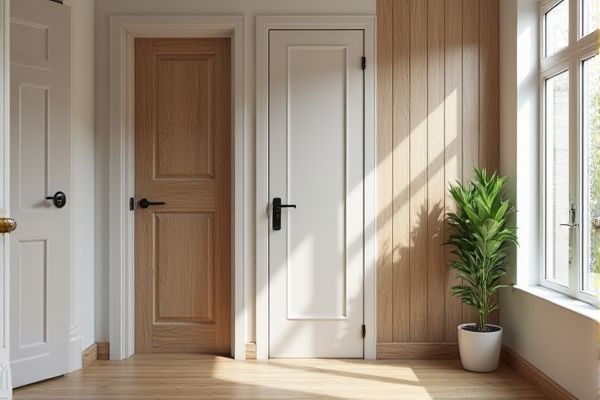
Vinyl wall panels offer moisture resistance and easy maintenance, making them ideal for a mudroom prone to dirt and humidity, while wood wall panels provide natural warmth and aesthetic appeal but may require more upkeep to prevent damage. Explore the article to discover which wall panel option best suits your mudroom's style and functionality.
Table of Comparison
| Feature | Vinyl Wall Panel | Wood Wall Panel |
|---|---|---|
| Material | Polyvinyl chloride (PVC) | Natural hardwood or softwood |
| Durability | Waterproof, resistant to mold and mildew | Susceptible to moisture damage without sealant |
| Maintenance | Easy to clean with soap and water | Requires regular sealing and polishing |
| Installation | Lightweight, easy snap-together panels | Heavier, may require nails or screws |
| Appearance | Variety of colors and textures, less natural look | Warm, classic natural wood grain |
| Cost | Generally lower upfront cost | Higher cost, depending on wood type |
| Environmental Impact | Made from synthetic materials, less eco-friendly | Renewable resource, biodegradable |
| Best Use in Mudroom | Ideal for moisture-prone areas | Better for dry or well-ventilated mudrooms |
Vinyl vs Wood Wall Panels: An Overview for Mudrooms
Vinyl wall panels in mudrooms offer superior moisture resistance and easy maintenance compared to wood, making them ideal for high-traffic, damp environments. Wood wall panels provide a warm, natural aesthetic and can be customized with stains or paints but may require more upkeep to prevent warping or water damage. Your choice between vinyl and wood depends on balancing durability needs with design preferences for your mudroom.
Durability of Vinyl and Wood Panels in Mudroom Settings
Vinyl wall panels in mudrooms offer superior durability against moisture, stains, and impacts, making them highly resistant to warping and rotting common in humid or wet conditions. Wood wall panels provide a classic aesthetic but require regular sealing and maintenance to prevent damage from water exposure, mold, and physical wear. Vinyl's moisture-resistant properties and ease of cleaning make it a practical choice for high-traffic mudroom environments, while wood panels excel in offering natural warmth and texture when properly treated.
Moisture Resistance: Vinyl Panels vs Wood in Mudrooms
Vinyl wall panels exhibit superior moisture resistance compared to wood panels, making them ideal for mudrooms frequently exposed to water and humidity. Unlike wood, vinyl does not warp, swell, or rot when exposed to moisture, ensuring durability and low maintenance in damp environments. Vinyl panels also resist mold and mildew growth, providing a hygienic and long-lasting wall solution in mudroom settings.
Maintenance Requirements: Comparing Vinyl and Wood Panels
Vinyl wall panels in a mudroom offer low maintenance, requiring only occasional wiping with a damp cloth and mild detergent to resist moisture, stains, and mold. Wood wall panels demand more upkeep, including periodic sealing or staining to protect against moisture damage and frequent cleaning to prevent mold and warping. Your choice between vinyl and wood panels will impact long-term maintenance efforts and durability in humid or high-traffic mudroom environments.
Aesthetic Options: Styles and Designs for Mudroom Walls
Vinyl wall panels offer a wide range of aesthetic options with various colors, textures, and patterns that mimic natural materials, providing versatile styles for mudroom walls. Wood wall panels bring authentic warmth and character through grain variations and can be customized with stains or paints for a timeless, rustic look. Your choice depends on whether you prioritize vinyl's durability and easy maintenance or wood's natural beauty and classic design.
Installation Process: Vinyl vs Wood Wall Panel Techniques
Vinyl wall panels in your mudroom offer a straightforward installation process with interlocking edges and adhesive backing, making them ideal for DIY projects and moisture-prone areas. Wood wall panels require precise measuring, cutting, and nailing to wall studs, demanding more time and carpentry skills but adding natural warmth and durability. Vinyl's moisture resistance simplifies maintenance, whereas wood panels may need sealants to prevent warping in humid conditions.
Cost Comparison: Vinyl Wall Panels vs Wood for Mudrooms
Vinyl wall panels for mudrooms generally offer a more budget-friendly option compared to wood wall panels, with costs typically ranging from $1 to $5 per square foot, while wood panels can range from $5 to $15 per square foot depending on the type and finish. Vinyl is also low-maintenance and resistant to moisture, reducing long-term expenses associated with repairs or refinishing that wood panels may require in damp environments like mudrooms. Choosing vinyl can maximize your investment by providing durability and affordability without sacrificing aesthetic appeal.
Eco-Friendliness: Sustainability of Vinyl and Wood Panels
Wood wall panels are generally more eco-friendly due to their renewable nature and biodegradability, especially when sourced from FSC-certified forests promoting sustainable harvesting. Vinyl wall panels, made from synthetic PVC, have a higher environmental impact due to fossil fuel extraction and limited recyclability, contributing to long-term landfill waste. Choosing reclaimed wood panels enhances sustainability by reducing deforestation and minimizing carbon footprint in mudroom installations.
Longevity and Wear: Which Panel Lasts Longer in Mudrooms?
Vinyl wall panels offer superior resistance to moisture, scratches, and dents, making them highly durable in high-traffic mudrooms where wet shoes and gear are common. Wood wall panels, while aesthetically warm and classic, are prone to warping, staining, and fading over time when exposed to humidity and dirt. Vinyl panels typically last longer in mudrooms due to their low maintenance and enhanced wear resistance compared to wood alternatives.
Choosing the Best Wall Panel for Your Mudroom: Key Factors
Vinyl wall panels offer superior water resistance and easy maintenance, making them ideal for mudrooms exposed to moisture and dirt. Wood wall panels provide natural insulation and a warm aesthetic but require regular sealing and care to prevent damage from humidity and wear. Evaluating durability, moisture resistance, and maintenance needs is crucial when selecting the best wall panel for your mudroom.
 homyna.com
homyna.com